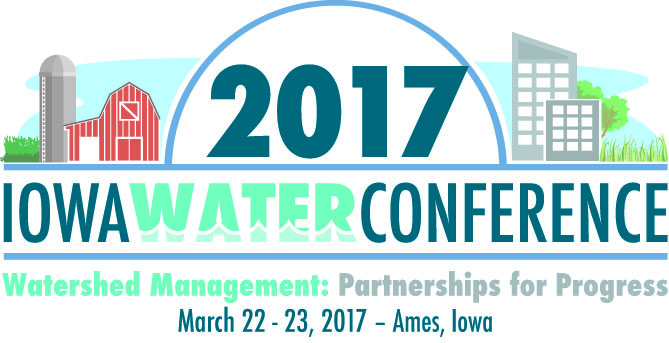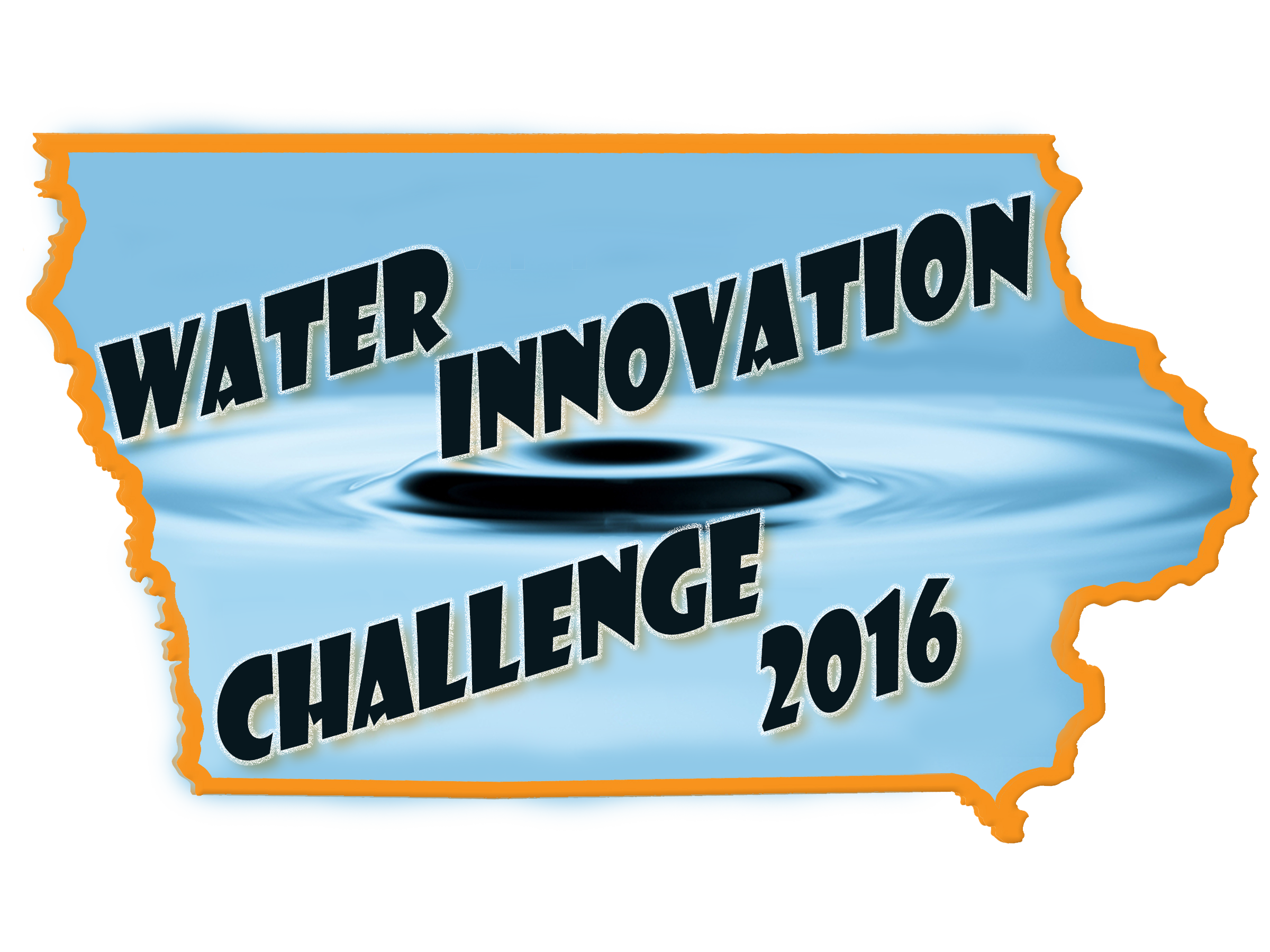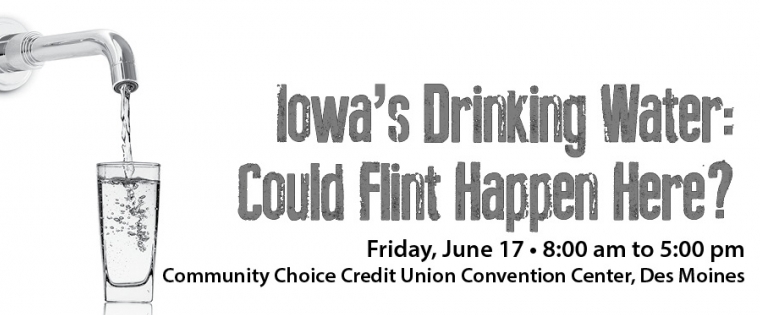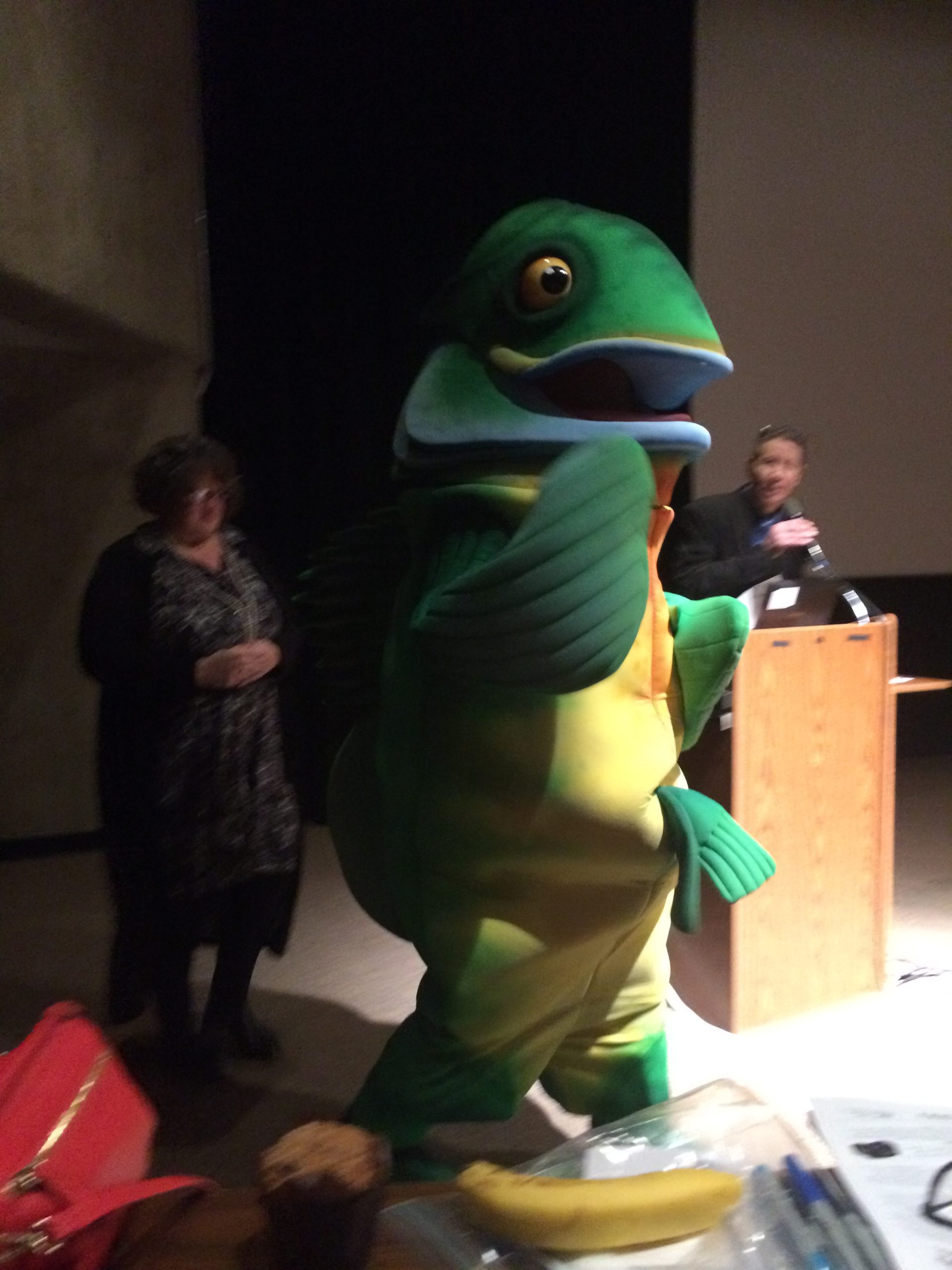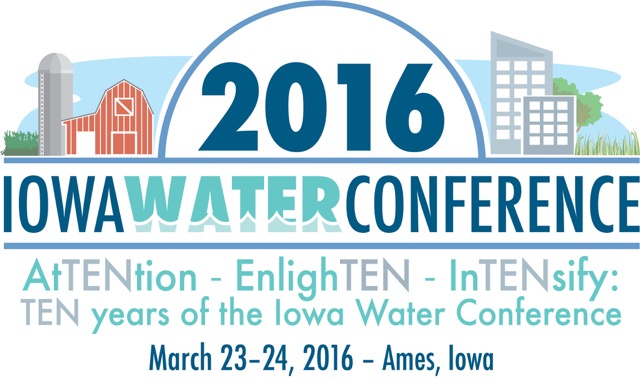Without water, there would be no life. Water serves as a medium in which we can grow healthy plants, innovate in industry, and play in the outdoors. From supporting our natural habitats to running through our kitchen faucets, it allows us to flourish as a community of living beings.
Continue readingCedar River Watershed Coalition Meeting Recap
On Friday, October 29, I had the good fortune of heading northeast to Parkersburg, Iowa for the Cedar River Watershed Coalition’s Fall 2016 meeting. This group has been convening since February of 2010, and I’ve made it to a few meetings in my time at the Iowa Water Center.
Continue readingIowa’s Water Crisis: Let’s Talk
We have all come to realize from the recent discourse in the news that water quality can be a bit political. Academic types, like myself, prefer to avoid situations where the political nature of controversial issues are likely to erupt. Last week, the Story County Iowa Democrats hosted a public discussion titled, “Iowa’s Water Crisis: Let’s Talk” in Ames, Iowa. I was invited to be part of the panel discussion alongside Bill Stowe, CEO of Des Moines Water Works, and Seth Watkins, a farmer and Republican from Southwest Iowa. During this event, we had the ‘opportunity’ to objectively discuss Iowa’s water crisis.
Continue readingIWConf17 presentation applications are due (really) soon
If you’ve been putting off submitting an application to present at the 2017 Iowa Water Conference, put it off no longer – applications are due Sunday night (Aug 14) at 11:59 p.m. The IWConf17 planning committee will review in the weeks following as the “first cut” for determining the 2017 conference agenda.
(It’s okay if you wait until Sunday to submit. It’s not procrastination. You’re busy. It’s prioritization.)
Wondering if you should submit an application? Do you answer yes to any of the following questions?
-Do you have a story to tell about watershed successes?
-Are you looking for partners for a current or new project?
-Do you have the latest tool in your water management field with proven results?
-Have you figured out a way to engage new sectors of populations in water-related activities or conversations?
From the call for applications:
Mixing entrepreneurs with H2O for a solution
Earlier this year, IWC Director Rick Cruse and Associate Director Melissa Miller met with staff from the Agricultural Entrepreneurship Initiative (AEI) at Iowa State University about an exciting new event idea. AEI team members have spent the last several months working tirelessly to organize Water Innovation Challenge 2016, an open community creative event that will join students, industry experts, scientists, entrepreneurs and YOU to collaborate and co-create new ideas that change the way we think about, manage, and use water in our state.
Details:
Waterpalooza 2016
Sept 1 & 2 (must be present both days)
Scheman Building, Iowa State University campus, Ames
$50 registration (FREE for current students)
Over $15,000 awarded in prizes
The event is facilitated by Dr. Jeffrey Stamp, a professional creative and concept developer who was the inventor of the Frito-Lay Baked! Lays® Potato Crisps. Dr. Stamp is a native of Sheldon, Iowa and leads creative innovation sessions worldwide for corporations, universities, and start-ups.
We at IWC are delighted to promote this event that will equip a variety of stakeholder with entrepreneurial skills all while thinking big and sharing ideas that will creatively address water quality issues in Iowa.
For guidelines, event schedule, and registration information, please visit the event’s webpage. Questions can be directed to Amanda Blair at acblair@iastate.edu or 515.294.4945. This event is sponsored by the Iowa Farm Bureau Federation.
Introducing a new intern by reflecting on #iowah2o
Marianne Murchison joined the Iowa Water Center as an intern from University of Missouri Columbia Masters of Public Health Policy and Promotion program in June 2016. Her background is in Political Science, Nonprofit Management and Public Health Policy. Since 2013, she has been supporting conservation efforts of the USDA NRCS in Iowa, Missouri and Oklahoma. She hopes to merge her education and experience to positively impact how the public views water quality and conservation as a public health issue.
“Drinking water supply is multidisciplinary.” – P. Barry Butler. These were the opening remarks for University of Iowa Public Policy Drinking Water Symposium titled Iowa’s Drinking Water: Could Flint Happen Here? held on June 17th 2016 in Des Moines. Throughout the day, speakers elaborated on their areas of expertise concerning Iowa’s drinking water concerns. Topics covered included: supply and demand (mainly making sure we price the commodity accurately), Lessons that Iowa can learn from the Flint, Michigan water crisis, exploration of the technology and innovation that are poised to revolutionize the drinking water industry, Iowa’s agricultural and natural threats to its drinking water supply and the best way to use policy to protect Iowa’s Drinking Water. Each topic further elaborated on how complex an issue access to safe water resources is in the state and beyond.
The overarching message was that Iowa’s drinking water concerns are environmental and public health problems. Framing safe drinking water as a public health necessity brings everyone together around this issue. While there were various opinions of how to protect and improve Iowa’s water resources were discussed, what was not up for debate was that if nothing is done, Flint-like problems could hit vulnerable water resources and aging infrastructure in Iowa and beyond. Everyone is part of the problem we all must be part of the solution. Iowans and water quality experts need to own their responsibility to solve and prevent water quality issues and, in Gandhi’s words, “be the change we want to see in the world” . . . of water.
Comment below and tell us what part you play in a sustainable future for Iowa’s drinking water.
Reflections on the 2016 Iowa Water Conference
It’s been a week since the opening of the 2016 Iowa Water Conference, one of the most highly attended events in its ten year history. We’ve been busy tying up loose ends, getting presentations posted on the event page, and even catching a few breaths here and there. A week removed seems like a good time to record some observations about this year’s conference as we look forward to 2017 (yes, already!).
You can’t control the weather. We had the conference three weeks later this year to avoid the inevitable early March “in like a lion” happenings. Mother Nature pretty much laughed in our faces, since the weather at the beginning of March was gorgeous, and the storm Wednesday night prevented several attendees and three speakers from making it to Thursday’s activities. (Absolutely enormous thank you to ISU Brent Pringnitz for setting these speakers up to present remotely in an unbelievably short turnaround period.)
Water is kind of a big deal. We had almost 500 people attend the water conference this year. That’s 100 more than last year. We had more posters, more exhibitors. People care about water so much that they will take two days out of their busy schedules to come learn and talk about it with people they may or may not know. The opening plenary even got media coverage on WHO TV.
The Iowa Water Conference shouldn’t be the only time we collaborate. We’ve received feedback from many people who want to make sure the cross-pollination that the Water Conference fosters stays at the forefront. One way to do that is to plan or attend local conferences/meetings/seminars on more specific interests (like tomorrow’s IGWA meeting in Newton). If you need help planning, let us know – we can help steer you in the right direction. If you’re looking for events, sign up for our newsletter. If you have an event, send it to us and we’ll help promote it.
This is YOUR conference. We made quite a few changes to this year’s conference to reflect the comments left in the evaluations from last year, and from what we can tell, they worked (for the most part). Please continue to send us your ideas throughout the year. We’ll have an open call for presentations during the summer months; you’ll find the announcement on this blog, our newsletter and Facebook and Twitter. We have an amazing core committee of conference planners, but can always use more ideas and voices. If you or your organization might want to be on our list of planning partners, give us a call.
There is a lot more we can say, but we’ll leave it at that for now. What were your takeaways from the 2016 Iowa Water Conference?
Iowa Groundwater Association Conference March 31
The Iowa Water Conference isn’t the only learning opportunity around these here parts – make sure you sign up to attend the Iowa Groundwater Association‘s Spring Conference. Registration is due in advance, so hop on over to their website to register – $75/members, $100/non-members, and $25/students until 3/24.
The details:
Thursday, March 31, 2016
DMACC Conference Center Auditorium – 600 N. 2nd Ave. West, Newton, Iowa
IGWA is honored to present this exciting line-up of speakers for our spring conference! Please join us in learning about the Flint Water Study, the DMWW lawsuit, avian influenza, antibiotic resistant bacteria, arsenic, radionuclides, and source water protection!
CEU’s are available for Groundwater Professionals (2), Certified Well Contractors (6), and Water Treatment Operators (0.5).
Presentations:
- Detection of Avian Influenza A in Groundwater: Results from the 2015 HPAI Outbreak – Laura Hubbard, USGS
- Protecting Source Waters in Agricultural Watersheds – Bill Stowe, Des Moines Water Works
- Flint Water Study – Anurag Mantha, Virginia Tech
- Fate and Transport of Antibiotic Resistant Bacteria and Resistance Genes in Tile Drained Agricultural Fields Receiving Swine Manure Application Over Four Years – Elizabeth Luby, Iowa State University
- Arsenic and Old Wells: Reducing Contamination Risks for Private Well Users – Sophia Walsh, Cerro Gordo County Dept. of Public Health
- Radionuclides in Alluvial and Shallow Bedrock Aquifers – Dustin May, State Hygienic Laboratory/University of Iowa
- Hydrogeologic Reconnaissance and Characterization for a Groundwater Source of Supply: Fort Madison, Iowa Case Study – Greg Brennan, HR Green
Water research presentations at the Iowa Water Conference
In addition to the many breakout presentations already scheduled at the Iowa Water Conference, we’ll also offer a venue for recent water research to be presented. The following eight presentations have been scheduled:
Wednesday, March 23
Plans to Make Satellite Soil Moisture Work in Iowa
Brian Hornbuckle, Iowa State University Department of Agronomy
New satellites are producing maps of current soil moisture conditions. There are problems, however. A NASA-led field experiment will be conducted in Central Iowa this coming summer to address these issues. We will describe the experiment plan.
Effects of Some Phosphorus and Soil Conservation Management Practices on Dissolved and Total Phosphorus Loss with Surface Runoff
Antonio Mallarino & Mazaq U. Har, Iowa State University Department of Agronomy
Efforts are being developed at federal, state, and private levels to reduce the impact of agricultural practices on phosphorus (P) loss from fields and water quality impairment. This presentation will share results of recent and ongoing Iowa research that has been looking at how management practices such as the P rate and source as well as other conservation practices impact the amount and proportion of dissolved and particulate P loss with surface runoff.
Understanding the Diversity in Nutrient Management Practice Use in Midwestern Agriculture
Hanna Bates, Prairie Rivers of Iowa
Social science studies have shown that information access and social networks can affect nutrient management practice adoption. In this presentation, we ask: What is the relationship between different aspects of farmers’ social networks and the adoption of diverse nutrient management practices? Using 2012 Rural Life Farm Poll data, this presentation attempts to answer that question and explore implications for outreach and technical support strategies to farmers.
How Efficiently do Corn- and Soybean-based Cropping Systems use Water? A Systems Modeling Analysis
Ranae Dietzel, Iowa State University Department of Agronomy
Agricultural systems are being challenged to decrease water use and increase production while climate becomes more variable and the world’s population grows. This work looked at systems-level definition of water use efficiency that addresses both production and environmental quality goals through incorporating all major system water losses. It provides a framework to concurrently evaluate production and environmental performance of cropping systems.
Thursday, March 24
Getting Into Soil and Water Virtually with PEWI
Lisa Schulte Moore, Iowa State University Natural Resource Ecology and Management
Soil and water conservation are top priorities for Iowans, but we are challenged in how to achieve it. Trying new things is costly, which stymies creativity. This presentation discusses an online tool, PEW, developed to help overcome this hurdle.
Comparing the water-use and water-use-efficiency of biomass sorghum and maize in the rain-fed, Midwest, US
Matt Roby, Iowa State University Department of Agronomy
Climate variability and a projected increase in demand for non-grain ethanol feedstock may necessitate expanding the production of more water-use-efficient and less drought sensitive crops for biofuel applications in the Midwest, US. This research highlights the importance of understanding the potential effects of expanding biomass sorghum production on the hydrologic cycle of the Midwestern US.
Seasonal forecasting of discharge for the Raccoon River at Van Meter, Iowa
Gabriele Villarini, University of Iowa IIHR-Hydroscience and Engineering
The state of Iowa is regularly afflicted by severe natural hazards such as the 2008/2013 floods and the 2012 drought. To improve preparedness for these catastrophic events and allow Iowans to make more informed decisions about the most suitable water management strategies, we have developed a framework for medium to long range probabilistic seasonal streamflow forecasting for the Raccoon River at Van Meter, a 8900-km2 catchment located in central-western Iowa.
Assessment of Flood Mitigation Strategies for the City of Kalona, Iowa
David Koser, University of Iowa IIHR-Hydroscience and Engineering
In order to reduce flooding, communitites often try to control runoff with a storm sewer network, detention basins, low impact developments, and upstream storage to reduce stream overflow. A couple 1D/2D hydraulic model using XPSWMM was created for the town of Kalona, IA, to test different strategies for flood reduction.
Registration open for 2016 Iowa Water Conference
It’s here! It’s perhaps one of the best days of the year over here at the Iowa Water Center! Registration has opened for the 2016 Iowa Water Conference. There is an overwhelming amount of information on the conference website, so scurry over there and take your time checking everything out. Some of the highlights:
- $150 regular/$75 student registration – ends March 11. Add $25 for late registration.
- $50 optional workshop – “The Psychology of Sustainable Behavior: A skill building workshop to support voluntary behavior change”
- $500 commercial exhibits/$50 nonprofit exhibits – commercial exhibits include one registration
- Poster registration is online again this year (there’s a big red button on the bottom to start registration)
Have any questions about this year’s conference? Call Melissa Miller at 515-294-7467 or send an email to millerms@iastate.edu. Can’t wait to see you in March!
P.S. If you see anyone from any of the following organizations, give them a pat on the back for their hard work in helping plan this year’s conference: Iowa Association of Municipal Utilities, Iowa Department of Agriculture and Land Stewardship, Iowa Department of Natural Resources, Iowa Flood Center, Iowa Floodplain and Stormwater Management Association, Iowa State University Extension and Outreach, Iowa Storm Water Education Program, Leopold Center for Sustainable Agriculture, Luther College, Natural Resources Conservation Service, Trees Forever and the U.S. Geological Survey — Iowa Water Science Center.
